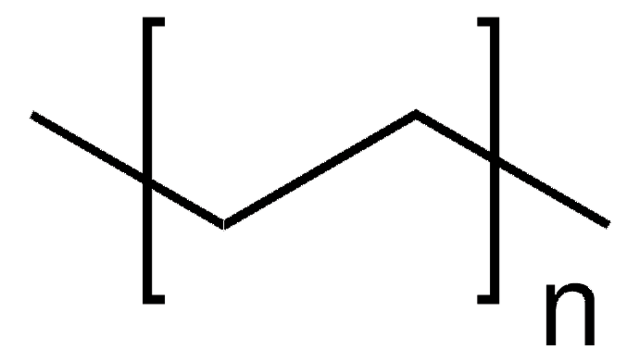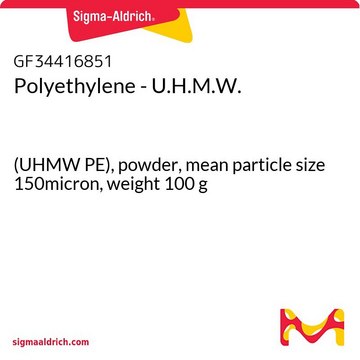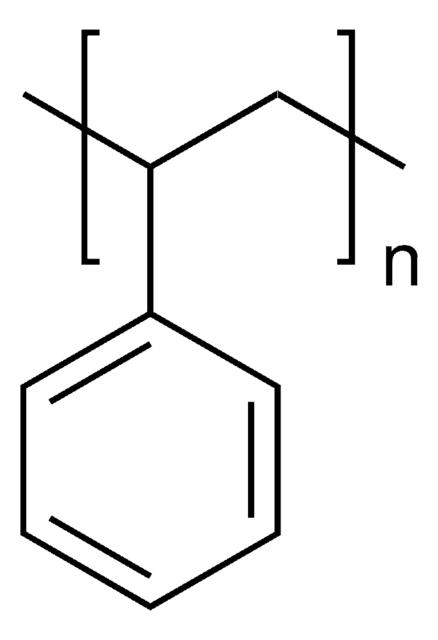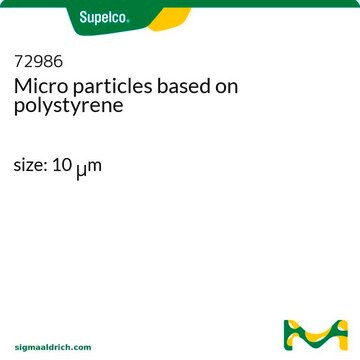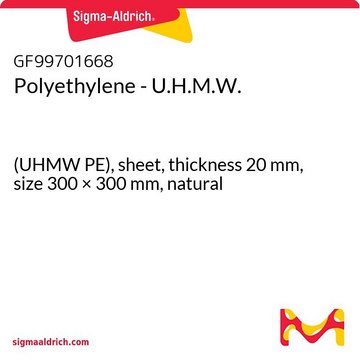Wszystkie zdjęcia(2)
Kluczowe dokumenty
434264
Polyethylene
Ultra-high molecular weight, surface-modified, powder, 125 μm avg. part. size
Zaloguj sięWyświetlanie cen organizacyjnych i kontraktowych
About This Item
Wzór liniowy:
H(CH2CH2)nH
Numer CAS:
Numer MDL:
Kod UNSPSC:
12162002
Identyfikator substancji w PubChem:
NACRES:
NA.23
Polecane produkty
Poziom jakości
Formularz
powder
masa cząsteczkowa
(Ultra-high molecular weight)
śr. rozm. cząst.
125 μm
mp
146 °C
temp. przejścia
Tm (DSC) 146 °C (at peak)
gęstość
0.94 g/mL at 25 °C
InChI
1S/C2H4/c1-2/h1-2H2
Klucz InChI
VGGSQFUCUMXWEO-UHFFFAOYSA-N
Szukasz podobnych produktów? Odwiedź Przewodnik dotyczący porównywania produktów
Zastosowanie
Additive to unsaturated polyesters, epoxides and other polymers to impart the unique properties of UHMWPE. Used in industrial parts, coatings and wear surfaces at 10-40 wt. %.
Cechy i korzyści
Polar surface groups assist chemical and physical bonding to matrix material. Contributes superior abrasion resistance, reduced coefficient of friction, enhanced tear strength and improved moisture resistance. Easier to process in particle form than molten UHMWPE.
Postać fizyczna
Particle surface is oxidized to contain acid and hydroxy groups.
Ta strona może zawierać tekst przetłumaczony maszynowo.
Kod klasy składowania
11 - Combustible Solids
Klasa zagrożenia wodnego (WGK)
WGK 3
Temperatura zapłonu (°F)
Not applicable
Temperatura zapłonu (°C)
Not applicable
Środki ochrony indywidualnej
Eyeshields, Gloves, type N95 (US)
Wybierz jedną z najnowszych wersji:
Masz już ten produkt?
Dokumenty związane z niedawno zakupionymi produktami zostały zamieszczone w Bibliotece dokumentów.
Klienci oglądali również te produkty
Eliandra Mirlei Rossi et al.
Journal of infection in developing countries, 7(3), 229-234 (2013-03-16)
Contaminated sponges might lead to cross-contamination in kitchens since they can transfer microorganisms to surfaces where microorganisms can survive for hours or days and contaminate food. The main objective of this study was to evaluate the transfer and the survival
Morteza Meftah et al.
The Journal of bone and joint surgery. American volume, 95(13), 1193-1197 (2013-07-05)
Ceramic femoral heads produce less wear of the opposing polyethylene than do metal femoral heads in wear simulation studies. This is a matched-pair analysis of the wear of ceramic and metal femoral heads on conventional polyethylene in uncemented total hip
Ingvild Bostadløkken et al.
Ugeskrift for laeger, 175(13), 891-892 (2013-04-16)
We present a case of a 66-year-old woman who had a total knee arthroplasty. Shortly after surgery a 90° rotation of her polyethylene liner took place. The complication was undiagnosed for 1.5 years. To know this problem and be able
Alicia E Leadford et al.
Pediatrics, 132(1), e128-e134 (2013-06-05)
Hypothermia contributes to neonatal mortality and morbidity, especially in preterm and low birth weight infants in developing countries. Plastic bags covering the trunk and extremities of very low birth weight infants reduces hypothermia. This technique has not been studied in
Kelly M Seymour et al.
Journal of biomechanical engineering, 135(2), 021017-021017 (2013-03-01)
Ultra high molecular weight polyethylene (UHMWPE, or ultra high), a frequently used material in orthopedic joint replacements, is often the cause of joint failure due to wear, fatigue, or fracture. These mechanical failures have been related to ultra high's strength
Nasz zespół naukowców ma doświadczenie we wszystkich obszarach badań, w tym w naukach przyrodniczych, materiałoznawstwie, syntezie chemicznej, chromatografii, analityce i wielu innych dziedzinach.
Skontaktuj się z zespołem ds. pomocy technicznej